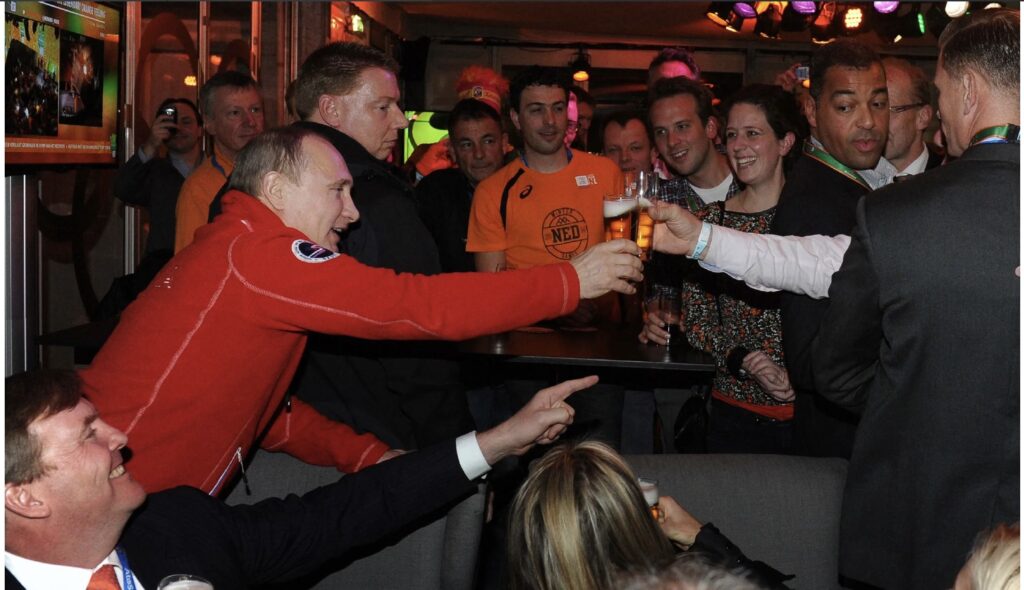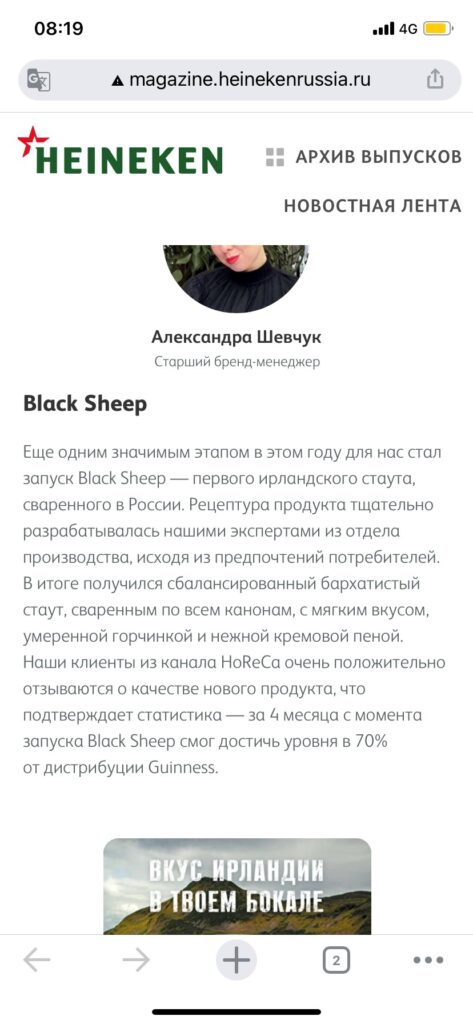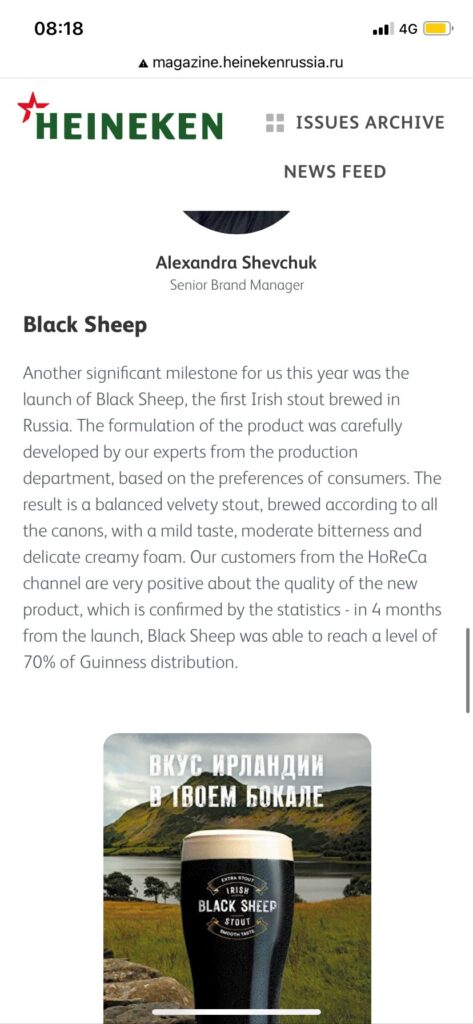HEINEKEN Ireland helped to develop a new stout in Russia when Guinness pulled out of the territory following the invasion of Ukraine, a whistleblower claims.
Named Black Sheep Irish Stout, the new product filled the void left by the withdrawal of Guinness and helped Heineken Russia increase profits as war raged in Ukraine.
Speaking to the Irish Mail on Sunday, the whistleblower said the Irish wing of the company directly helped Heineken ‘to develop a copycat version of Guinness’.
In a statement to the MoS this weekend, Heineken confirmed some ‘very limited and remote technical support’ had been provided to its Russian arm.
But the global beer giant denied its Irish team shared the recipe for stout and insisted no ‘brand or marketing support’ was provided.
The Heineken Europe whistleblower said they were shocked to discover Heineken Ireland had been involved in helping to develop Black Sheep stout in Russia.
They told the MoS: ‘At some point I found out it wasn’t only the Amsterdam HQ but also the Irish organisation that actively participated in this, by directly helping Heineken Russia to develop a copycat version of Guinness after Diageo left Russia. I believe the Irish public and employees of Heineken Ireland have the right to know about this.’
Black Sheep Irish Stout was developed in record time by Heineken following the invasion of Ukraine on February 24, 2022.

According to leading brewing insiders who spoke with the MoS this week, it would typically take up to two years to develop and bring a new stout to market.
This was the case when Heineken launched its now discontinued Island’s Edge stout in recent years.
But in Russia, Heineken was able to roll out its Black Sheep stout within a few months of the outbreak of the war.
Diageo, the owners of Guinness, paused its Russian operations on March 7, 2022, and in June 2022 pulled out of Russia completely in a move costing €172m, including €15.3m for redundancies.
But Heineken, which had been brewing Guinness in Russia under licence, took a different approach.
At the outbreak of war, Heineken announced it was halting ‘investments and exports’ to Russia, and ending ‘the production, sale and advertising of the Heineken brand’.
The company declared at the time: ‘We will not accept any net financial benefits or profit from our business in Russia.’
In late March 2022, Heineken announced its decision to ringfence its Russian arm until a buyer was found, saying in a statement: ‘We aim for an orderly transfer to a new owner in full compliance with international and local laws.
‘To ensure the ongoing safety and wellbeing of our employees and to minimise the risk of nationalisation, we concluded it is essential that we continue with the recently reduced operations during this transition period.’
After releasing the statement, the company quickly launched dozens of new products in Russia using non-Heineken brand names.
This new drive led to increased profits and market share until a new buyer was found for the Russian operation 18 months later, in August 2023.
According to the Heineken Russia accounts from 2022, this increased turnover by 14% to €470m (42bn rubles), while profits tripled to almost €30m (2.6bn rubles).
The Russian accounts also show the company sold 720,000 hectolitres more beverages than in the previous year.
As a result, President Vladimir Putin’s regime was boosted by millions in extra taxes which Heineken Russia contributed to the Russian war economy.
The array of new products on offer included the newly developed Black Sheep Irish Stout, widely advertised as ‘the Taste of Ireland’ with many Russian reviewers directly referring to it as a replacement for Guinness.
Calling the new stout ‘Russian Guinness’, one local reviewer, Igor Samsonovich, concluded: ‘This is truly a dry Irish stout style beer. It’s different from Guinness Draft, but it’s as close to Guinness as you can get.’
Heineken even commissioned a video and billboard ad featuring a smiling Russian citizen by the name of ‘Arman Armenovich Guinness’.
‘Guinness recommends Black Sheep,’ the tongue-incheek ad slogan blared as Mr Guinness downed a velvety black pint in a Russian bar.
Heineken’s delight at the success of Black Sheep was evident in a report posted on its Russian website in late 2022:


‘This launch deserves a special page in our history,’ said the now-deleted update. ‘In a few months, Heineken Brewery and the Production Department of the Central Office created a unique product that easily replaced a brand which is 263 years old!
‘And thanks to colleagues from the Marketing and Sales Departments, this drink is sold in 900 outlets just a few months after launch. This is an amazing result that we can rightfully be proud of.’
This web page was deleted after Dutch investigative outlet, Follow the Money, published it last year.
The whistleblower this week spoke of their disappointment when the Dutch story first emerged.
‘As a Heineken employee, like many of my colleagues, I was very disappointed to see how my employer misled the public and employees about its withdrawal from Russia in 2022. This happened despite the company’s proclaimed values and purpose of “brewing a better world”.’
According to the whistleblower, Heineken Ireland was asked to help with the development of the new Black Sheep stout.
They claimed this request was made by Ruud Van den Eijnden, the company’s European managing director, who allegedly acted as a go-between when the Russian arm requested help from Ireland.
At the time, the Russian arm was led by Boudewijn Haarsma, now general manager of Heineken UK.
Contacted by the MoS this week, Mr Van den Eijnden replied he did not remember making a request to the Irish operations in relation to the new stout. ‘I don’t remember that at all,’ he said. ‘I know I never spoke to Boudewijn about it.’
Asked what role Ireland played in development of Black Sheep stout for Russia, Mr Van den Eijnden said: ‘I genuinely don’t know.’
He then referred our queries elsewhere, saying ‘these kinds of questions go through our corporate communications department’.
Boudewijn Haarsma, who was in charge of Heineken Russia when the Ukraine invasion took place and who is an old school friend of Mr Van den Eijnden, replied to our queries by text to say: ‘I was not the MD in Russia at the time of Black Sheep launch and left Russia in May 2022.’
Mr Haarsma did not respond further when we pointed out he was in place in the lead-up to the launch.
Another executive in Russia at the time of the Black sheep launch was Radina Shkutova, who previously spent time serving as Heineken’s marketing director in Ireland.
When asked about the role the company’s Irish operation played in the development of Black Sheep stout, she said: ‘I cannot comment on this.’
Another Heineken executive, Thijs Derksen, also declined to answer questions when we spoke to him about Irish involvement, saying: ‘I didn’t work on a Russian product – not at all, and I’m not going to comment further on this.’
At the time of the Russian stout launch, Mr Derksen was Heineken’s Irish supply chain manager, a position he now occupies in Serbia. This Irish job placed him in charge of Heineken’s only stout brewery in Europe, the Murphy’s Brewery in Cork.
None of the executives replied to a question asking if they felt morally comfortable with the way Heineken dealt with its Russian arm after the invasion of Ukraine.
After we contacted the above executives and others at Heineken, the company’s global communications director, Joris Evers, went on to issue a statement saying that Heineken was one of the ‘few companies that has actually fully exited Russia’.
Mr Evers added the ring-fenced Russian arm had been tasked with ‘replacing lost volume’ to replace the halted sale of Heineken branded products in Russia.
He said this was necessary to avoid bankruptcy, to protect the livelihoods of employees and to assure continuity until a company sale could be achieved.
Mr Evers confirmed that these efforts, led by the local Russia team, had received ‘very limited and remote technical support’.
Asked to clarify precisely what remote support anyone in Ireland had provided, Mr Evers did not elaborate further.
Dutch beer giant capitalised on Diageo exit as war raged
IN AUGUST 2023, Heineken announced it had found a buyer for its Russian business, as the Arnest Group took over 100% of Heineken Russia’s shares for a token fee of €1.
Announcing the deal, Heineken said it was writing off Russian assets worth €300m. But it had also secured a guarantee that Heineken would be repaid €100m in inter-company debt by the new Russian owners.
The deal – and promised €100m payback to Heineken – was made possible, in part, because of the profits generated by Heineken’s successful seizure of a Russian stout market formerly dominated by Diageo’s Guinness.
This and the launch of other new products helped Heineken’s profits to soar in Russia in advance of the deal as the war in Ukraine raged.
Earlier this year, Heineken apologised for creating ‘ambiguity’ over its initial promise to leave Russia – made when the Ukraine war had commenced a year previously.
After the war began, Heineken stopped selling its namesake beer but developed Black Sheep Irish Stout to seize a gap in the Russian Guinness market.
This was just one of 61 new products launched by Heineken in Russia as Vladimir Putin’s forces bombarded Ukraine.
‘We recognise that we should’ve been clearer earlier about the need to introduce new products, and the questions raised about this are understandable,’ Heineken said in March last year.
‘We realise this has created ambiguity and doubt about our promise to leave Russia. For this we apologise.’
This week Heineken told the MoS it was ‘one of the few companies that has actually fully exited Russia’.
The company insisted it had remained firm to its principles by caring for its employees, avoiding bankruptcy until a sale could take place, and ensuring the company was not nationalised.
Heineken also said it would receive ‘no financial gain – no proceeds, royalties or fees from Russia nor profit on exit’. A spokesman said: ‘We held to these principles and exited responsibly in August 2023, also removing our key global brands. At the same time, many other multinationals continue to operate in Russia today.’

When there’s more than one Black Sheep in the flock..
ON May 27, 2022, Heineken’s United Brewery in St Petersburg submitted application no. 2022734538 to the Federal Institute of Industrial Property (FIPS) in Moscow to trademark the Black Sheep name.
With the war in Ukraine just three months old, Heineken wanted to secure the name, with the company poised to roll out a newly developed Irish stout to fill the void left by the departure of Guinness from Russia.
The move represented a turnaround for Heineken, which prior to the war had been brewing Guinness under licence in St Petersburg. In fact, on February 2, Heineken had even launched a new product for Guinness, called Guinness Smooth.
But when FIPS received Heineken’s application to trademark the Black Sheep name, there was a problem – it was already in use in Russia by the UK’s Black Sheep Brewery, which first exported there in 2016.
At the beginning of the war in Ukraine, the UK brewer removed its Black Sheep Imperial Russian Stout and Black Sheep Vodka from sale, saying in a statement: ‘We do not feel selling these products is appropriate at this moment in time.’
The North Yorkshire brewery has since renamed products as Imperial Yorkshire Stout and Imperial Yorkshire Vodka, but does not sell them to Russia.
But FIPS nevertheless refused Heineken the right to trademark the Black Sheep name, ruling that it would cause confusion. Heineken appealed and lost, but proceeded regardless – such is business in Russia.
This leaves the door open for the UK’s Black Sheep to object to the use of its name on Heineken products. But this week executive director Jo Theakston declined to say if the company would do so.
‘The Russian trade market remains complex as a result of the ongoing war in Ukraine,’ he told the Irish Mail on Sunday.
‘As such, we don’t feel it’s appropriate to comment on any potential appropriation of the “Black Sheep” name.
‘At Black Sheep Brewery, we remain committed to our stance regarding trading in Russian markets, upholding our decision to cease trading with the nation until the current situation is resolved,’ Mr Theakston added.

